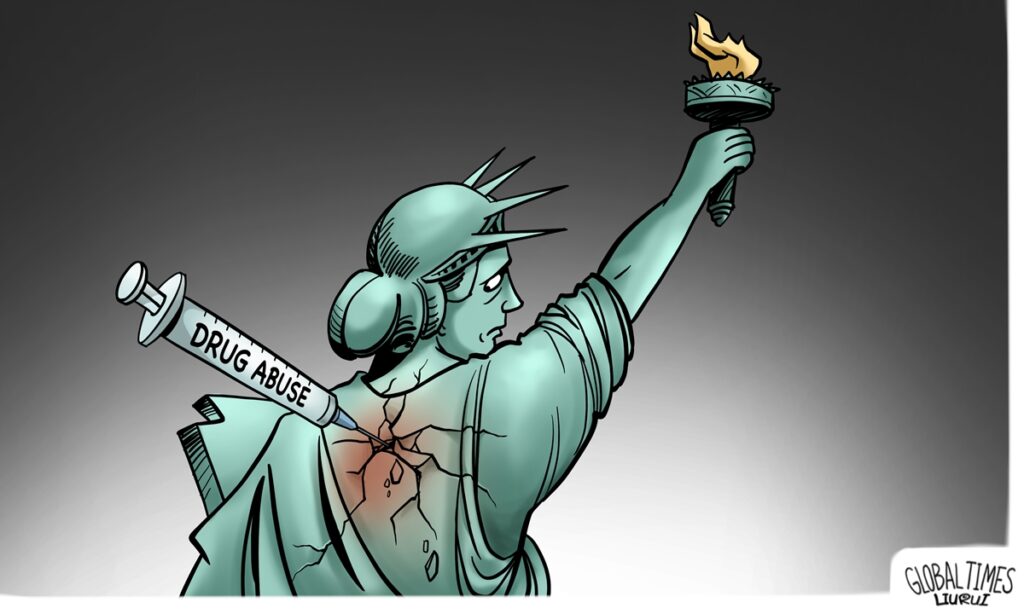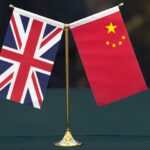US scapegoating China over drug issues to intensify during election race: experts
China is one of the most stringent countries in the world when it comes to implementing the United Nations (UN) Convention Against Illicit Traffic in Narcotic Drugs and Psychotropic Substances. Since the country regulated the entire category of fentanyl-class substances in 2019, its related controls have been unprecedented and been fully recognized by the international community, and the country has not received any notification from other countries that fentanyl-class substances from China have been seized, according to the latest press release by the Chinese Embassy in the US.
The Chinese embassy presented the extraordinary achievements China has made in its drug-crackdown at home and abroad, in a resounding response to the vicious and baseless smears as well as buck-passing from the US on the issue.
Not long after US Secretary of State Antony Blinken mentioned in Beijing in June that the two countries “need much greater cooperation” to solve the fentanyl issue, the US Department of Justice charged Chinese individuals “related to fentanyl problems” that were ensnared through a US “sting operation” in a third country, putting on a very typical US show of smearing and attacking China while asking China to cooperate.
The series of data-based efforts and achievements made by China have scotched these slanders.
According to the article published by the Chinese Embassy in the US on Thursday, at present, the number of precursor chemicals listed in China has reached 38 (including a large category of ephedrine substances), far exceeding the 14 controlled varieties listed by the UN.
Since China acceded to the UN Convention Against Illicit Traffic in Narcotic Drugs and Psychotropic Substances in October 1989, the country has been one of the most stringent countries in the world in implementing it, strictly fulfilling its obligations under the convention on the control of precursor chemicals, international verification and data submission, and adding controls on a greater range of substances at home in addition to those listed under international controls.
In accordance with international conventions and domestic laws and regulations, China has issued pre-export notifications over internationally controlled varieties and other China-controlled varieties. Since 2018, a total of 18,387 international inspections of 17.9 million tons of drugs have been carried out, and 4.24 million tons have been blocked.
On May 1, 2019 the Chinese government took an innovative approach in implementing the regulations against the entire category of fentanyl substances and adopted a series of effective crackdown and rectification measures, playing an important role in preventing the illegal manufacturing, trafficking and abuse of such substances. The control of fentanyl-class substances is unprecedented in China’s routine drug control practice, and is a concrete manifestation of China’s practice of the concept of co-governance of the global drug problem, which has been fully recognized by the international community, according to the embassy release.
After the entire class of fentanyl was regulated, China has not received any notification from other countries that fentanyl-related substances from China have been seized.
A Chinese expert on drugs told the Global Times on Thursday that it should be noted that due to the painful memory of the Opium War in the 1840s, China is the country that hates drugs the most in the world and is also one of the most effective countries in combating them.
In fact, Chinese people are not familiar with “fentanyl.” In 2019, China became the first in the world to officially put all fentanyl-related substances under control on humanitarian grounds, even though there was no large-scale abuse of them in China. This did a big favor to the US, which is deeply mired in the “fentanyl crisis.” But the “favor returned” by the US turned out to be sanctions against Chinese individuals and related Chinese institutions with baseless accusations, the anonymous expert noted.
Also, according to the embassy release, China has signed 50 inter-governmental and inter-departmental drug control cooperation documents with more than 30 countries and coalitions of states, established annual meeting mechanisms with 13 countries, joined five multilateral drug control cooperation mechanisms including the Shanghai Cooperation Organization, and set up 13 border drug control liaison offices with neighboring countries.
China has actively promoted the establishment of joint drug enforcement operations such as the “Safe Waterway” in the Mekong River basin, the China-Australia “Flame,” China-Cambodia and China-Vietnam joint anti-drug operations, and jointly cracked down on more than 800 major cross-border drug cases in recent years, effectively maintaining social security and stability.
Under these constant efforts and firm determination to control drugs, drug-related crimes have been reduced year by year.
In 2022, 35,000 drug crimes were solved, 53,000 suspects were arrested, and 21.9 tons of drugs were seized, down, respectively, 78.8 percent, 72.7 percent and 78.6 percent from the peak in 2015. A total of 197,000 drug addicts were apprehended, down 71.5 percent from the peak.
Drug manufacturing activities have declined significantly. The number of domestic drug manufacturing plants busted in China dropped from 572 in 2013 to 128 in 2022, a decrease of 77.7 percent, and the average amount of drugs seized per case dropped from 58 kg to 1.5 kg. The share of domestic drugs in the Chinese market has dropped from more than 70 percent at the peak to less than 10 percent at present.
Also, the penetration of large-scale drug trafficking in the “Golden Triangle” region has decreased. In 2022, Southwest China’s Yunnan Province, which is adjacent to the “Golden Triangle” region, cracked 3,438 drug crime cases and seized 9.6 tons of various drugs, the lowest number of solved cases in 30 years and the lowest number of drug seizures in 12 years.
Disregarding these intensive drug-control efforts by China, the US has hyped that the country is “sourcing fentanyl precursor chemicals from China,” trying to put the label of “drug trafficker” on China.
This kind of hype is very amateurish. The “fentanyl precursors” mentioned by the US are actually chemicals that can be used in the production of fentanyl, but they are ordinary commodities that are not controlled under international drug conventions and Chinese law, and the products previously sanctioned by the US even include ordinary medical molds such as capsule filling machines, experts pointed out.
The US is known to have the worst drug problem in the world. 12 percent of global drug users come from the country, three times the proportion of the US population to that of the rest of the world.
A recent discovery of cocaine in the White House once again exposed the chaotic management over drugs in the US. Reuters cited a source as saying that cocaine had been found in a cubby hole in a West Wing entry area where visitors place electronics and other belongings before going on tours.
Washington accusing China over fentanyl is aimed at giving an account to the domestic audience in an attempt to scapegoat China, and in the hope this drug issue will no longer become an excuse for the opposition party to attack the current US administration, Li Haidong, a professor at the China Foreign Affairs University, told the Global Times on Thursday.
All of these controversial issues during the election race are highly politicized, including drug issues. As the US enters the election race period, the buck-passing to China over such issues will intensify as the two main parties try to incite hatred against China among the public to gain more votes, Li believes.
(Global Times)




